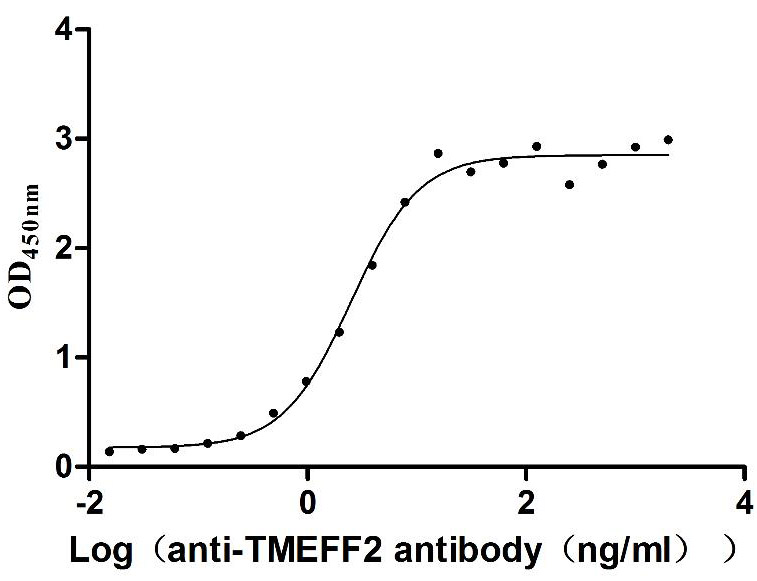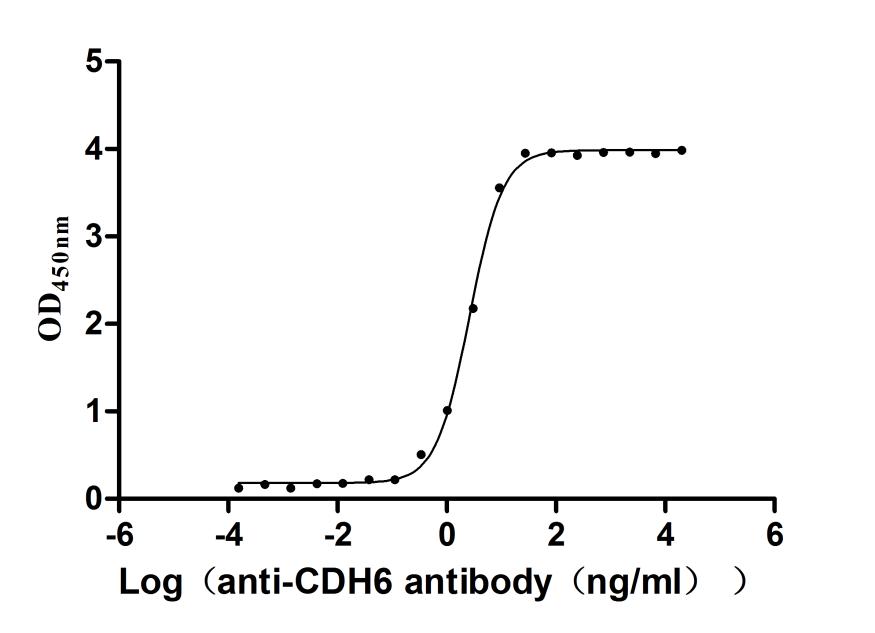Recombinant Mouse ALK tyrosine kinase receptor (Alk), partial
-
货号:CSB-YP001606MO
-
规格:
-
来源:Yeast
-
其他:
-
货号:CSB-EP001606MO
-
规格:
-
来源:E.coli
-
其他:
-
货号:CSB-EP001606MO-B
-
规格:
-
来源:E.coli
-
共轭:Avi-tag Biotinylated
E. coli biotin ligase (BirA) is highly specific in covalently attaching biotin to the 15 amino acid AviTag peptide. This recombinant protein was biotinylated in vivo by AviTag-BirA technology, which method is BriA catalyzes amide linkage between the biotin and the specific lysine of the AviTag.
-
其他:
-
货号:CSB-BP001606MO
-
规格:
-
来源:Baculovirus
-
其他:
-
货号:CSB-MP001606MO
-
规格:
-
来源:Mammalian cell
-
其他:
产品详情
-
纯度:>85% (SDS-PAGE)
-
基因名:
-
Uniprot No.:
-
别名:AlkALK tyrosine kinase receptor; EC 2.7.10.1; Anaplastic lymphoma kinase; CD antigen CD246
-
种属:Mus musculus (Mouse)
-
蛋白长度:Partial
-
蛋白标签:Tag type will be determined during the manufacturing process.
The tag type will be determined during production process. If you have specified tag type, please tell us and we will develop the specified tag preferentially. -
产品提供形式:Lyophilized powder
Note: We will preferentially ship the format that we have in stock, however, if you have any special requirement for the format, please remark your requirement when placing the order, we will prepare according to your demand. -
复溶:We recommend that this vial be briefly centrifuged prior to opening to bring the contents to the bottom. Please reconstitute protein in deionized sterile water to a concentration of 0.1-1.0 mg/mL.We recommend to add 5-50% of glycerol (final concentration) and aliquot for long-term storage at -20℃/-80℃. Our default final concentration of glycerol is 50%. Customers could use it as reference.
-
储存条件:Store at -20°C/-80°C upon receipt, aliquoting is necessary for mutiple use. Avoid repeated freeze-thaw cycles.
-
保质期:The shelf life is related to many factors, storage state, buffer ingredients, storage temperature and the stability of the protein itself.
Generally, the shelf life of liquid form is 6 months at -20°C/-80°C. The shelf life of lyophilized form is 12 months at -20°C/-80°C. -
货期:Delivery time may differ from different purchasing way or location, please kindly consult your local distributors for specific delivery time.Note: All of our proteins are default shipped with normal blue ice packs, if you request to ship with dry ice, please communicate with us in advance and extra fees will be charged.
-
注意事项:Repeated freezing and thawing is not recommended. Store working aliquots at 4°C for up to one week.
-
Datasheet :Please contact us to get it.
靶点详情
-
功能:Neuronal receptor tyrosine kinase that is essentially and transiently expressed in specific regions of the central and peripheral nervous systems and plays an important role in the genesis and differentiation of the nervous system. Transduces signals from ligands at the cell surface, through specific activation of the mitogen-activated protein kinase (MAPK) pathway. Phosphorylates almost exclusively at the first tyrosine of the Y-x-x-x-Y-Y motif. Following activation by ligand, ALK induces tyrosine phosphorylation of CBL, FRS2, IRS1 and SHC1, as well as of the MAP kinases MAPK1/ERK2 and MAPK3/ERK1. Acts as a receptor for ligands pleiotrophin (PTN), a secreted growth factor, and midkine (MDK), a PTN-related factor, thus participating in PTN and MDK signal transduction. PTN-binding induces MAPK pathway activation, which is important for the anti-apoptotic signaling of PTN and regulation of cell proliferation. MDK-binding induces phosphorylation of the ALK target insulin receptor substrate (IRS1), activates mitogen-activated protein kinases (MAPKs) and PI3-kinase, resulting also in cell proliferation induction. Drives NF-kappa-B activation, probably through IRS1 and the activation of the AKT serine/threonine kinase. Recruitment of IRS1 to activated ALK and the activation of NF-kappa-B are essential for the autocrine growth and survival signaling of MDK. Thinness gene involved in the resistance to weight gain: in hypothalamic neurons, controls energy expenditure acting as a negative regulator of white adipose tissue lipolysis and sympathetic tone to fine-tune energy homeostasis.
-
基因功能参考文献:
- Anaplastic lymphoma kinase (ALK) is a novel regulator of NLRP3 inflammasome activation in macrophages. Mechanically, ALK-mediated NF-kappaB activation was required for the priming step of NLRP3 upregulation, whereas ALK-mediated lipid peroxidation contributed to the sensing step of NLRP3-NEK7 complex formation. PMID: 29723525
- NLRR1 appears to be an extracellular negative regulator of ALK signalling in neuroblastoma and neuronal development. PMID: 27604320
- These data support an important role for the p55gamma subunit of PI3K in ALK-induced cell migration during brain development PMID: 27322022
- Increased ETS exposure was closely associated with EGFR mutations in female never-smokers with NSCLC in the expanded multinational cohort. However, the association of ETS and ALK rearrangements in never-smokers with NSCLC was not significant. PMID: 28433570
- Anaplastic lymphoma kinase (ALK) is a receptor tyrosine kinase associated with alcohol dependence in humans and behavioral responses to ethanol in mice. PMID: 26752591
- ALKR1275Q cooperated with MYCN in the development of aggressive NB, possibly by downregulating the expression of ECM/BM-associated genes and by conferring malignant potentials to MYCN-expressing cells. PMID: 26829053
- ALK inhibitor alectinib inhibits tumor growth in a TH-MYCN transgenic neuroblastoma mouse model. PMID: 28455243
- Alk -/- mice initially consume more ethanol and have increased basal and ethanol-stimulated GABA release in the central nucleus of the amygdala when compared to Alk +/+ mice. After chronic ethanol exposure, Alk +/+ mice escalate their ethanol consumption, whereas Alk -/- mice do not. Basal GABA release in Alk -/- mice is not enhanced by chronic intermittent ethanol-two bottle choice drinking as it is in Alk +/+ mice. PMID: 26946429
- An oral anaplastic lymphoma kinase (ALK) inhibitor. PMID: 26361725
- ALK knock out male mice exhibit hypogonadotropic hypogonadism. PMID: 25955180
- Ethanol activates ALK (and MDK) signaling in the brain which regulates behaviors related to alcohol abuse. PMID: 26206265
- Hyperactivation of Alk induces neonatal lethality in knock-in AlkF1178L mice. PMID: 24811761
- Mutations in the ALK gene is associated with neuroblastoma. PMID: 24811913
- Th-MYCN genetically-engineered murine models of neuroblastoma using MRI, we have identified a marked ALK(F1174L)-driven vascular phenotype. PMID: 24667968
- Reduced ALK1 expression is associated with increased extracellular matrix protein expression, proliferation and migration in fibroblasts. PMID: 24594380
- findings demonstrate a pathogenic role for ALK(F1174L) in neuroblastomas overexpressing MYCN and suggest a strategy for improving targeted therapy for ALK-positive neuroblastoma PMID: 22789543
- KLC1-ALK is the first novel oncogenic fusion identified using only formalin-fixed paraffin-embedded tissue tissues PMID: 22347464
- In hippocampus, Alk and Ltk (leukocyte tyrosine kinase) are expressed throughout dentate gyrus, CA1, and CA3. Data suggest enhanced performance in spatial memory and reduced neurogenesis in Alk mutant/knockout mice. PMID: 22079349
- High anaplastic lymphoma kinase is associated with angiogenesis in neuroblastoma. PMID: 21829174
- novel ALK point mutations possessed tumorigenic effects mainly through hyperphosphorylation of Y1604 and activation of downstream oncogenic signaling. PMID: 21847362
- Alk plays an evolutionary conserved role in ethanol-related behaviors PMID: 21799923
- Transcription of anaplastic lymphoma kinase (Alk) is repressed by LMO4 in the striatum and Alk promotes the development of cocaine sensitization and conditioned place preference. PMID: 21976498
- data show that neoplastic mast cells (MC) express IL-9 receptors, that IL-9 and NPM-ALK upregulate MC-production in vivo, and that both'hits' act in concert to induce a mastocytosis-like disease in mice PMID: 21297223
- Cellular transformation is not an inevitable consequence of NPM-ALK activity but is combated by p53 and Rb. PMID: 21423761
- ALK activation of Rap1 via the Rap1-specific GEF C3Gmay contribute to cell proliferation and oncogenesis of neuroblastoma. PMID: 20190816
- A ligand-inducible epidermal growth factor receptor/anaplastic lymphoma kinase chimera promotes mitogenesis and transforming properties in 3T3 cells. PMID: 11919185
- role of anaplastic lymphoma kinase and pleiotrophin signaling in apoptosis PMID: 12107166
- midkine binds to ALK and has a role in signal transduction for cell growth and survival PMID: 12122009
- overexpression in fused forme with NPM induced different types of malignant lymphomas in IL-9 transgenic mice PMID: 12555065
- Alk chimera is endocytosis impaired. PMID: 14691459
- ALK receptor tyrosine kinase has roles promoting cell growth and neurite outgrowth PMID: 15226403
- ALK has a proapoptotic activity in the absence of ligand, whereas it is antiapoptotic in the presence of its ligand and when the kinase is intrinsically activated. PMID: 16880530
- Alk is an effective oncoantigen for lymphoma vaccination. PMID: 18469826
- The expression of the dual specificity phosphatase CDC25A, is deregulated in Ba/F3 cells expressing the oncogenic protein NPM/ALK and in human cell lines derived from NPM/ALK-positive anaplastic large cell lymphomas. PMID: 19305144
显示更多
收起更多
-
亚细胞定位:Cell membrane; Single-pass type I membrane protein.
-
蛋白家族:Protein kinase superfamily, Tyr protein kinase family, Insulin receptor subfamily
-
组织特异性:Mainly expressed in central nervous system (CNS) and other parts of the brain such as the paraventricular nucleus (PVN) of the hypothalamus. Expression is also found in peripheral nervous systems, eye, nasal epithelium, olfactory nerve, tongue, skin, tiss
-
数据库链接:
KEGG: mmu:11682
STRING: 10090.ENSMUSP00000083840
UniGene: Mm.311854
Most popular with customers
-
Recombinant Human Angiotensin-converting enzyme 2 (ACE2), partial,Biotinylated (Active)
Express system: Mammalian cell
Species: Homo sapiens (Human)
-
Recombinant Human Receptor tyrosine-protein kinase erbB-2 (ERBB2), partial (Active)
Express system: Mammalian cell
Species: Homo sapiens (Human)
-
Recombinant Human Signal transducer CD24 (CD24)-Nanoparticle (Active)
Express system: Mammalian cell
Species: Homo sapiens (Human)
-
Recombinant Mouse Claudin-18 (Cldn18)-VLPs (Active)
Express system: Mammalian cell
Species: Mus musculus (Mouse)
-
Express system: Mammalian cell
Species: Homo sapiens (Human)
-
Recombinant Human Dickkopf-related protein 1 (DKK1) (Active)
Express system: Mammalian cell
Species: Homo sapiens (Human)
-
Recombinant Human Tomoregulin-2 (TMEFF2), partial (Active)
Express system: Mammalian cell
Species: Homo sapiens (Human)
-
Recombinant Human Cadherin-6(CDH6),partial (Active)
Express system: Mammalian cell
Species: Homo sapiens (Human)


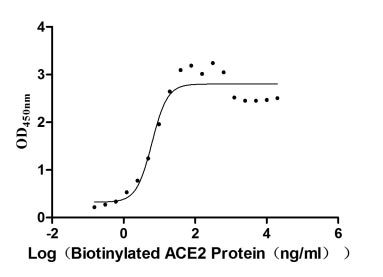
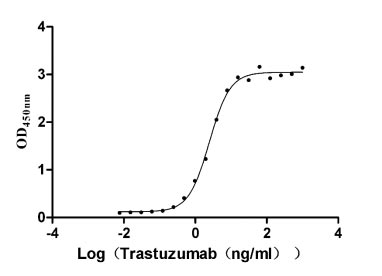
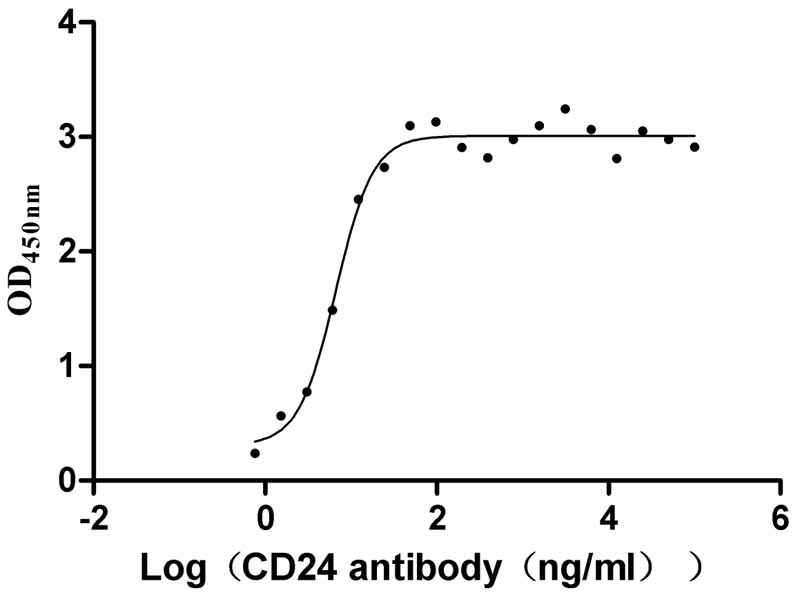
-AC1.jpg)
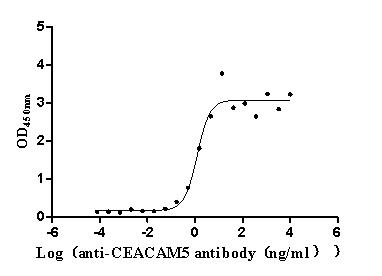
-AC1.jpg)
